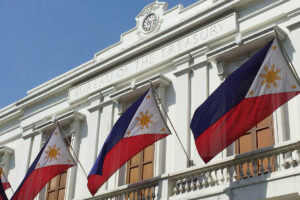BTr partially awards T-bills as rates rise on tariff fears

THE GOVERNMENT partially awarded the Treasury bills (T-bills) it offered on Monday as yields climbed on weaker demand and concerns over the potential economic impact of the Trump administration’s trade policies.
The Bureau of the Treasury (BTr) raised P24.15 billion from the T-bills it auctioned off on Monday, falling short the P25-billion plan, as total bids reached P45.667 billion, almost twice the amount on offer but lower than the P67.88 billion in tenders recorded on March 25 for a P22-billion offering.
Broken down, the Treasury borrowed P7.15 billion via the 91-day T-bills, lower than the P8-billion program, even as tenders for the tenor reached P12.335 billion. The three-month paper was quoted at an average rate of 5.307%, rising by 15 basis points (bps) from the 5.157% seen at the previous auction. Tenders accepted by the BTr carried yields of 5.148% to 5.379%.
The BTr said made a partial award of the three-month T-bill to cap the rise in yields “given lagging demand and the wide dispersion of submitted bids which reached higher than those of the longer tenor T-bills,” it said in a statement.
Meanwhile, the government made a full P8-billion award of the 182-day securities as bids for the paper amounted to P17 billion. The average rate of the six-month T-bill was at 5.646%, 9.2 bps higher than the 5.554% fetched last week, with accepted rates ranging from 5.5% to 5.749%.
Lastly, the Treasury raised P9 billion as planned via the 364-day debt papers as demand for the tenor totaled P16.332 billion. The average rate of the one-year debt rose by 6.7 bps to 5.748% from 5.681% previously, with bids accepted having yields of 5.64% to 5.788%.
At the secondary market before Monday’s auction, the 91-, 182-, and 364-day T-bills were quoted at 5.2978%, 5.6163%, and 5.7763%, respectively, based on PHP Bloomberg Valuation Service (BVAL) Reference Rates data provided by the Treasury.
The government partially awarded its T-bill offer as rates rose, with investors staying cautious due to the uncertainties surrounding US Donald J. Trump’s tariff plans and their potential impact on the monetary easing cycles of both the Federal Reserve and the Bangko Sentral ng Pilipinas, analysts said.
“The same noise was observed ahead of last February’s Monetary Board meeting, which led to Bangko Sentral ng Pilipinas (BSP) keeping policy rates unchanged. So, although local inflation data has been positive for quite a while, we don’t know how much the ongoing ‘trade war’ weighs when it comes to the BSP’s policy,” a trader said in a text message.
At its Feb. 13 meeting, the Monetary Board unexpectedly kept benchmark rates unchanged, which BSP Governor Eli M. Remolona, Jr. said was a “prudent” move amid uncertainty over the trade policies of Mr. Trump.
Mr. Remolona said last week that there is a “good chance” that the Monetary Board will cut rates by 25 bps at their April 10 review, adding that the BSP remains on an easing cycle and could reduce borrowing costs by as much as 75 bps this year depending on data.
The central bank has brought down benchmark interest rates by a total of 75 bps since it began its rate-cut cycle in August last year, with its policy rate currently at 5.75%.
Rizal Commercial Banking Corp. Chief Economist Michael L. Ricafort said in a Viber message that Mr. Trump’s planned reciprocal tariffs could lead to slower US economic growth and higher inflation or stagflation, which could result in fewer Fed rate cuts.
T-bill yields also climbed due to weaker demand week on week, Mr. Ricafort added. “Auction yields are now mostly slightly higher versus the comparable short-term PHP BVAL yields, except for the 364-day tenor, … but still mostly below the key local policy rate of 5.75%,” he said.
Mr. Trump said on Sunday that reciprocal tariffs he is set to announce this week will include all nations, not just a smaller group of 10 to 15 countries with the biggest trade imbalances, Reuters reported.
Mr. Trump has promised to unveil a massive tariff plan on Wednesday, which he has dubbed “Liberation Day.” He has already imposed tariffs on aluminum, steel and autos, along with increased tariffs on all goods from China.
White House economics adviser Kevin Hassett recently told Fox Business that the administration’s tariffs focus would be on 10 to 15 countries with the worst trade imbalances, though he did not list them.
Mr. Trump sees tariffs as a way of protecting the domestic economy from unfair global competition and a bargaining chip for better terms for the US.
However, concerns about a trade war are unsettling markets and creating fears of a recession in the US.
Many economists are worried that tariffs will hit the US economy hard, even while limiting the Federal Reserve’s scope to cut rates by also lifting inflation in the short term.
On Wednesday, the government will offer P30 billion in reissued seven-year Treasury bonds (T-bond) with a remaining life of five years and three months. This week’s T-bond auction was moved from the usual Tuesday schedule due to the Eid’l Fitr holiday.
The Treasury is looking to raise P245 billion from the domestic market this month or P125 billion via T-bills and P120 billion through T-bonds.
The government borrows from local and foreign sources to help fund its budget deficit, which is capped at P1.54 trillion or 5.3% of gross domestic product this year. — A.M.C. Sy with Reuters




